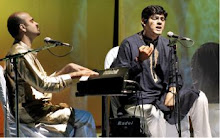Part-time or Pastime
ANIL SRINIVASAN
I had emails from several readers requesting me to keep my columns simpler and less serious, and so I decided to start this week's piece on a different subject. And so I focus on myself, and why I have come to love music more than anything else in the world. This is an easy topic for me to be humorous about, but extremely difficult to write nonetheless. So hopefully, some of those confessions might make you all think of the role music has had to play in your own lives. So here goes.
I am 31 years old. I am reasonably bright, and I like well-ordered things, drinking tea at odd hours and reading a lot. I went abroad and had the benefit of a great education. Unlike many of my peers, I decided to come back as soon as I finished my education. The energy Chennai has managed to create is irresistible, as only those who have come rushing back will know. I make music, teach and consult, and am considered fairly competent on all of those things. More importantly, I love every one of these activities and engage in them whole-heartedly. So far, so good.
At a conference last year, I was among many musicians registering dissent when a prominent classical musician announced to the gallery that those involved in anything less than a 24 hour pursuit of classical music ought not to call themselves musicians. Those who straddled music alongside careers in the corporate world were "hobby musicians" or "pastimers", she argued. Perhaps this is true to some extent, considering the economic sacrifices many of the greatest musical names through history have made in favour of a full-time dedication to the one thing they adored. But "pastimers" as a descriptor refused to sit well with me, and this leads me to the crux of today's essay.
The pursuit of music, regardless of the time one devotes to it, requires seriousness on the part of the executor. It commands absolute surrender. Music is seldom an "outcome", and this becomes evident the moment my fingers start moving on the keys. It becomes a journey with several routes to traverse, unexpected surprises assaulting one's consciousness at every turn. To the listener, this particular set of notes may resemble a composition but to me, it is always an exploration into the unknown. I am barely conscious of what I am playing. As in meditation, I can only focus on the breathing. In this case, it becomes the unguided automaticity of skin on enamel, finger on key, heart on string. An outcome happens to get crafted at the end of the exercise. I often surprise myself when I listen to recordings of my playing as I rarely remember specific phrases or patterns I have played.
On the flip side, I actually find that my life in the "outside world" often helps in this process of musical discovery. To me, my parallel pursuits offer a different perspective on structures, emotionality and form. For instance, at a concert in Bangalore with Chitravina Ravikiran, I found myself harmonizing a certain phrase in contrary progressions – a system of chords in which the intervals between any two concurrently played notes of a single chord increase progressively ( so, the main melodic note is accompanied first by a note on the third place from it, then the fourth from it and so on in the right hand (i.e. 1-3, 1-4, 1-5…) while the left hand starts with the seventh note from the initial note and comes progressively closer(7-1, 6-1, 5-1 etc.). When I thought about this later, it struck me that this idea for harmonics came from studying a bar chart at work, when two histograms of opposing rates of growth had been juxtaposed against each other. This was not a premeditated idea, merely an unconscious application of my wandering mind.
Every time I approach my instrument, I set off reflexes that have become conditioned with time and age. I feel nervousness, excitement and a rush of adrenalin without having to control these processes. These reflexes are unmarred by anything that I do while not actively engaging with music. On the contrary, the human interactivity and enforced adaptability of other domains provides me immense relief, a balanced perspective and increasingly, some interesting ideas.
I do not say this to exhort those engaged in music full-time to apply for corporate jobs. With due respect, all I submit for consideration is the possibility that a life that constantly travels between domains absorbs many good things from each of these domains. Osmosis is integral to my performance in the non-musical realm as well. I often find that my approach to decision making in business has benefited greatly from my daily musical routine.
Ellington once said that there are two kinds of music in this world, the good kind and what he humorously termed "the other" kind. Whether music is part-time or pastime, I think the only hope for every musician (and only a musician knows himself to be who he is!) is to avoid making the latter!
Copyright The New Sunday Express
Friday, June 27, 2008
Subscribe to:
Post Comments (Atom)


1 comment:
Lovely post, but infact quite a serious one once again! :-) Keep writing, I look forward to reading your blogs.
Post a Comment